formerly eScholarship Editions


|
|
|
|
Your search for
'Classics' in subject
and
Public
in rights
found 42 book(s). | Modify Search | Displaying 1 - 20 of 42 book(s) | |
| 1. | 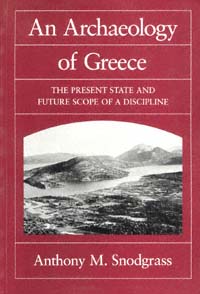 | Title: An archaeology of Greece: the present state and future scope of a discipline Author: Snodgrass, Anthony M Published: University of California Press, 1987 Subjects: Classics | Archaeology | European History Publisher's Description: Classical archaeology probably enjoys a wider appeal than any other branch of classical or archaeological studies. As an intellectual and academic discipline, however, its esteem has not matched its popularity. Here, Anthony Snodgrass argues that classical archaeology has a rare potential in the who . . . [more] Similar Items |
| 2. | 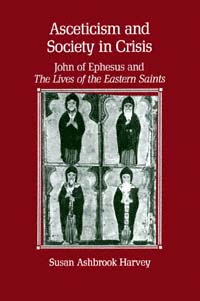 | Title: Asceticism and society in crisis: John of Ephesus and the Lives of the Eastern saints Author: Harvey, Susan Ashbrook Published: University of California Press, 1990 Subjects: Classics | Classical Religions | Classical History Publisher's Description: John of Ephesus traveled throughout the sixth-century Byzantine world in his role as monk, missionary, writer and church leader. In his major work, The Lives of the Eastern Saints , he recorded 58 portraits of monks and nuns he had known, using the literary conventions of hagiography in a strikingly personal way. War, bubonic plague, famine, collective hysteria, and religious persecution were a part of daily life and the background against which asceticism developed an acute meaning for a beleaguered populace. Taking the work of John of Ephesus as her guide, Harvey explores the relationship between asceticism and society in the sixth-century Byzantine East.Concerned above all with the responsibility of the ascetic to lay society, John's writing narrates his experiences in the villages of the Syrian Orient, the deserts of Egypt, and the imperial city of Constantinople. Harvey's work contributes to a new understanding of the social world of the late antique Byzantine East, skillfully examining the character of ascetic practices, the traumatic separation of "Monophysite" churches, the fluctuating roles of women in Syriac Christianity, and the general contribution of hagiography to the study of history. [brief] Similar Items |
| 3. | 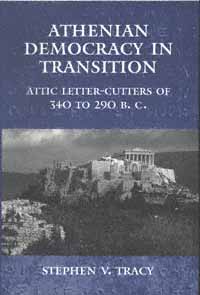 | Title: Athenian democracy in transition: Attic letter-cutters of 340 to 290 B.C Author: Tracy, Stephen V 1941- Published: University of California Press, 1995 Subjects: Classics | Ancient History | Archaeology Publisher's Description: Furthering his masterful new approach to classifying and interpreting epigraphical data presented in Attic Letter-Cutters of 229 to 86 B.C. , Stephen V. Tracy has produced a masterful study of the inscriptions from the time of King Philip of Macedon, Alexander the Great, Demosthenes, and Demetrios. Detailed study of the hands in this largest group of primary documents has enabled him to offer a number of new insights, such as reassessing the career of Demetrios of Phaleron and taking issue with the commonly accepted view that Athenian democracy ended in 322 B.C. with the defeat by the Macedonians at Krannon.Tracy pieces together stone documents and shows that the "handwriting" of individual stonecutters can be identified by the way particular letters are cut into the stone. He offers new readings, redatings, joins and associations, as well as initial publication of some fragments from the excavations in the Athenian agora. [brief] Similar Items |
| 4. | 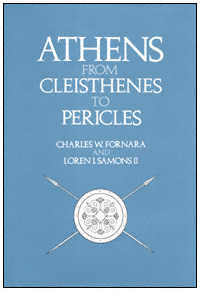 | Title: Athens from Cleisthenes to Pericles Author: Fornara, Charles W Published: University of California Press, 1991 Subjects: Classics | Classical History | Classical Politics Publisher's Description: By the mid fifth century B.C., Athens had become the most powerful city-state in Greece: a rich democracy led by Pericles that boldly gained control of an empire. Athens's strength under Pericles was the result of a complex interaction of events from the time of Cleisthenes. Fornara and Samons unravel the intricacies of the conflicting ancient sources to show how the development of both democracy and empire were interdependent in Athens's multifaceted evolution. The authors trace and contrast four stands of development: the history of the Alcmeonid family of Cleisthenes and Pericles, the nature and development of Athenian democracy, the growth of Athenian empire, and the burgeoning antagonism between Athens and Sparta. The fresh perspective thus afforded by this clear presentation will intrigue those with interests in both ancient economics and politics.The figure of Pericles is central to all four avenues of inquiry. His decision to create the enmisthos polis marked a fateful turn. Henceforth the democracy and the empire presupposed each other. Ultimately, Pericles's policies fueled Sparta's growing insecurity, resulting in her declaration of war on Athens in 431 B.C. and Athens's eventual fall. [brief] Similar Items |
| 5. | 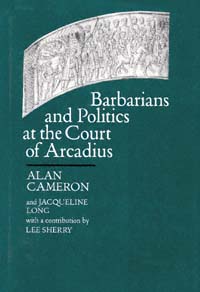 | Title: Barbarians and politics at the Court of Arcadius Author: Cameron, Alan Published: University of California Press, 1993 Subjects: Classics | Religion | Ancient History Publisher's Description: The chaotic events of A.D. 395-400 marked a momentous turning point for the Roman Empire and its relationship to the barbarian peoples under and beyond its command. In this masterly study, Alan Cameron proposes a complete rewriting of received wisdom concerning the social and political history of these years. Our knowledge of the period comes to us in part through Synesius of Cyrene, who recorded his view of events in his De regno and De providentia . By redating these works, Cameron offers a vital, new interpretation of the interactions of pagans and Christians, Goths and Romans.In 394/95, during the last four months of his life, the emperor Theodosius I ruled as sole Augustus over a united Roman empire that had been divided between at least two emperors for most of the preceding one hundred years. Not only did the death of Theodosius set off a struggle between Roman officeholders of the two empires, but it also set off renewed efforts by the barbarian Goths to sieze both territory and office. Theodosius had encouraged high-ranking Goths to enter Roman military service; thus well placed, their efforts would lead to Alaric's sack of Rome in 410. Though Cameron's interest is in the particularities of events, the book conveys a wonderful sense of the general time and place. Cameron's rebuttal of modern scholarship, which pervades the narrative, enhances the reader's engagement with the complexities of interpretation. The result is a sophisticated recounting of a period of crucial change in the Roman Empire's relationship to the non-Roman world. [brief] Similar Items |
| 6. | 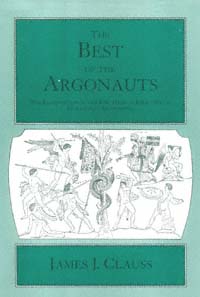 | Title: The best of the Argonauts: the redefinition of the epic hero in book one of Apollonius's Argonautica Author: Clauss, James Joseph Published: University of California Press, 1993 Subjects: Classics | Literature | Classical Literature and Language | Literary Theory and Criticism Publisher's Description: This revelatory exploration of Book One of the Argonautica rescues Jason from his status as the ineffectual hero of Apollonius' epic poem. James J. Clauss argues that by posing the question, "Who is the best of the Argonauts?" Apollonius redefines the epic hero and creates, in Jason, a man more realistic and less awesome than his Homeric predecessors, one who is vulnerable, dependent on the help of others, even morally questionable, yet ultimately successful.In bringing Apollonius' "curious and demanding poem" to life, Clauss illuminates two features of the poet's narrative style: his ubiquitous allusions to the poetry of others, especially Homer, and the carefully balanced structural organization of his episodes. The poet's subtextual interplay is explored, as is his propensity for underscoring the manipulation of the poetry of others through ring composition. [brief] Similar Items |
| 7. | 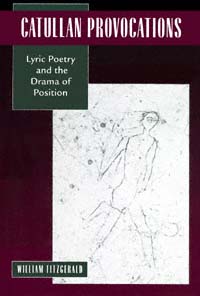 | Title: Catullan provocations: lyric poetry and the drama of position Author: Fitzgerald, William 1952- Published: University of California Press, 1996 Subjects: Classics | Comparative Literature | Classical Literature and Language | Poetry Publisher's Description: Restoring to Catullus a provocative power that familiarity has tended to dim, this book argues that Catullus challenges us to think about the nature of lyric in new ways. Fitzgerald shows how Catullus's poetry reflects the conditions of its own consumption as it explores the terms and possibilities of the poet's license. Reading the poetry in relation to the drama of position played out between poet, poem, and reader, the author produces a fresh interpretation of almost all of Catullus's oeuvre. Running through the book is an analysis of the ideological stakes behind the construction of the author Catullus in twentieth-century scholarship and of the agenda governing the interpreter's position in relation to Catullus. [brief] Similar Items |
| 8. | 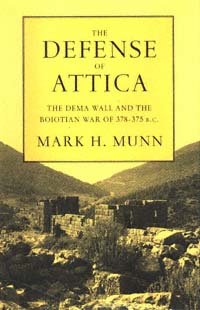 | Title: The defense of Attica: the Dema wall and the Boiotian War of 378-375 B.C Author: Munn, Mark Henderson Published: University of California Press, 1993 Subjects: Classics | Art and Architecture | Ancient History Publisher's Description: The enigmatic three-mile-long Dema wall in the countryside outside ancient Athens has perplexed archaeologists and historians for decades. When was it built and what role did it play in Greek military history? In a tour de force of archaeological and historical argument, Mark H. Munn establishes the place of the Dema wall in the defense of Athens and offers a completely new perspective on the Boiotian War.Since no ancient reference to the wall survives, scholars have contested the date and purpose of the wall's construction, placing it anywhere between the Geometric Age and Hellenistic eras. While directing the excavation of a watchtower above the wall, Munn's chance discovery of a datable sherd in the wall's remains fixed the date of the wall's construction at 378 B.C., the onset of the three-year Boiotian War. Munn offers an absorbing narrative account of the war, and his descriptions and effective use of literary extracts render a vivid portrayal of the opposing generals, military tactics, and battle scenes. [brief] Similar Items |
| 9. | 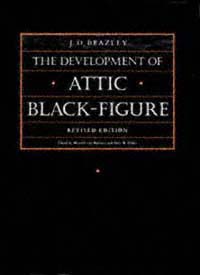 | Title: The development of Attic black-figure Author: Beazley, J. D. (John Davidson) 1885-1970 Published: University of California Press, 1986 Subjects: Classics | Art and Architecture Publisher's Description: The eight lectures that comprise this edition were first delivered by John Davidson Beazley in 1949. They were published in 1951 and soon became a of classical study of ancient Greek vases. This revised edition includes many additional illustrations. Similar Items |
| 10. | 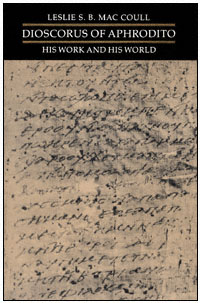 | Title: Dioscorus of Aphrodito: his work and his world Author: MacCoull, Leslie B Published: University of California Press, 1989 Subjects: Classics Publisher's Description: From the hand of Dioscorus of Aphrodito, sixth-century Coptic lawyer and poet, we have the only autograph poems to come down to us on papyrus from the late ancient world. Both the poetry he wrote for special occasions and the documents he produced in his legal career, in Greek and Coptic, reflect the major preoccupations of Dioscorus' society and his age: the nature of Byzantine imperial government, the patronage of the powerful elite, and the spirituality of the Egyptian Christian church. Thanks to residence in Egypt and many years of work with the original papyri, Leslie S. B. MacCoull is able to present a comprehensive picture of Dioscorus and his times. Through detailed analyses of the documents and poems, some previously unknown, she leads us to a fresh perception of the Coptic culture of Byzantine Egypt. She reveals the man and his world as inheritors of and contributors to the Egyptian-Classical-Christian fusion of society and intellectual life that gave birth to Gnosticism and the Desert Fathers. Dioscorus of Aphrodito epitomizes the little-known cultural flowering of late antique Egypt, which is now seen not as a place of sterility and decadence, but as the home of a strikingly original and creative culture whose subsequent eclipse still remains unexplained. [brief] Similar Items |
| 11. | 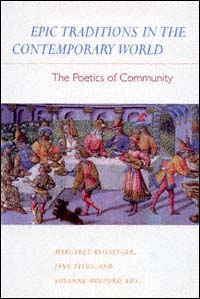 | Title: Epic traditions in the contemporary world: the poetics of community Author: Beissinger, Margaret H Published: University of California Press, 1999 Subjects: Literature | Classics | Classical Literature and Language | Comparative Literature Publisher's Description: The epic tradition has been part of many different cultures throughout human history. This noteworthy collection of essays provides a comparative reassessment of epic and its role in the ancient, medieval, and modern worlds, as it explores the variety of contemporary approaches to the epic genre. Employing theoretical perspectives drawn from anthropology, literary studies, and gender studies, the authors examine familiar and less well known oral and literary traditions - ancient Greek and Latin, Arabic, South Slavic, Indian, Native American, Italian, English, and Caribbean - demonstrating the continuing vitality of the epic tradition.Juxtaposing work on the traditional canon of western epics with scholarship on contemporary epics from various parts of the world, these essays cross the divide between oral and literary forms that has long marked the approach to the genre. With its focus on the links among narrative, politics, and performance, the collection creates a new dialogue illustrating the sociopolitical significance of the epic tradition. Taken together, the essays raise compelling new issues for the study of epic, as they examine concerns such as national identity, gender, pedagogy, and the creation of the canon. [brief] Similar Items |
| 12. | 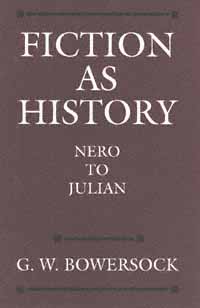 | Title: Fiction as history: Nero to Julian Author: Bowersock, G. W. (Glen Warren) 1936- Published: University of California Press, 1997 Subjects: Classics | Literature | European History | Classical Religions | Christianity | Ancient History Publisher's Description: Using pagan fiction produced in Greek and Latin during the early Christian era, G. W. Bowersock investigates the complex relationship between "historical" and "fictional" truths. This relationship preoccupied writers of the second century, a time when apparent fictions about both past and present were proliferating at an astonishing rate and history was being invented all over again. With force and eloquence, Bowersock illuminates social attitudes of this period and persuasively argues that its fiction was influenced by the emerging Christian Gospel narratives.Enthralling in its breadth and enhanced by two erudite appendices, this is a book that will be warmly welcomed by historians and interpreters of literature. [brief] Similar Items |
| 13. | 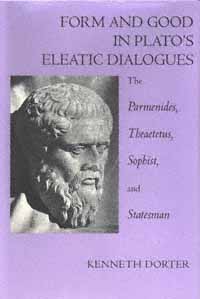 | Title: Form and good in Plato's Eleatic dialogues: the Parmenides, Theaetetus, Sophist, and Statesman Author: Dorter, Kenneth 1940- Published: University of California Press, 1994 Subjects: Classics | Philosophy | Classical Literature and Language Publisher's Description: In this innovative analysis, Plato's four eleatic dialogues are treated as a continuous argument. In Kenneth Dorter's view, Plato reconsiders the theory of forms propounded in his earlier dialogues and through an examination of the theory's limitations reaffirms and proves it essential. Contradicted are both those philosophers who argue that Plato espoused his theory of forms uncritically and those who argue that Plato in some sense rejected the theory and moved toward the categorical analysis developed byAristotle. Dorter's reexamination of Plato's insights implies an important new direction for modern philosophical inquiry. [brief] Similar Items |
| 14. | 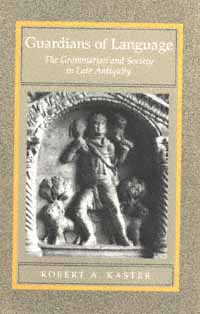 | Title: Guardians of language: the grammarian and society in late antiquity Author: Kaster, Robert A Published: University of California Press, 1997 Subjects: Classics | Classical Literature and Language | Language and Linguistics | Ancient History Publisher's Description: What did it mean to be a professional teacher in the prestigious "liberal schools" - the schools of grammar and rhetoric - in late antiquity? How can we account for the abiding prestige of these schools, which remained substantially unchanged in their methods and standing despite the political and religious changes that had taken place around them?The grammarian was a pivotal figure in the lives of the educated upper classes of late antiquity. Introducing his students to correct language and to the literature esteemed by long tradition, he began the education that confirmed his students' standing in a narrowly defined elite. His profession thus contributed to the social as well as cultural continuity of the Empire. The grammarian received honor - and criticism; the profession gave the grammarian a firm sense of cultural authority but also placed him in a position of genteel subordination within the elite.Robert A. Kaster provides the first thorough study of the place and function of these important but ambiguous figures. He also gives a detailed prosopography of the grammarians, and of the other "teachers of letters" below the level of rhetoric, from the middle of the third through the middle of the sixth century, which will provide a valuable research tool for other students of late-antique education. [brief] Similar Items |
| 15. | 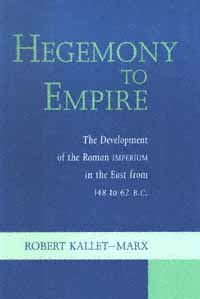 | Title: Hegemony to empire: the development of the Roman Imperium in the East from 148 to 62 B.C Author: Kallet-Marx, Robert Morstein Published: University of California Press, 1996 Subjects: Classics | History | Ancient History Publisher's Description: In one of the most important contributions to the study of Roman imperialism to appear in recent years, Robert Kallet-Marx argues for a less simplistic, more fluid understanding of the evolution of Roman power in the Balkans, Greece, and Asia Minor. He distinguishes between hegemony - the ability of the Romans to command obedience on the basis of a real or implied military threat - and the later phenomenon of empire, demonstrating that Roman imperium was not the result of the sudden imposition of geographically defined provinces or permanent armies. Rather, the integration of the Greek world into a Roman imperial system was a complex process of evolution requiring mutual adaptation by both Romans and Greeks. [brief] Similar Items |
| 16. | 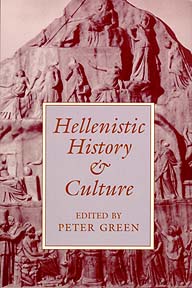 | Title: Hellenistic history and culture Author: Green, Peter 1924- Published: University of California Press, 1993 Subjects: Classics | Classical Philosophy | Ancient History | History Publisher's Description: In a 1988 conference, American and British scholars unexpectedly discovered that their ideas were converging in ways that formed a new picture of the variegated Hellenistic mosaic. That picture emerges in these essays and eloquently displays the breadth of modern interest in the Hellenistic Age.A distrust of all ideologies has altered old views of ancient political structures, and feminism has also changed earlier assessments. The current emphasis on multiculturalism has consciously deemphasized the Western, Greco-Roman tradition, and Nubians, Bactrians, and other subject peoples of the time are receiving attention in their own right, not just as recipients of Greco-Roman culture.History, like Herakleitos' river, never stands still. These essays share a collective sense of discovery and a sparking of new ideas - they are a welcome beginning to the reexploration of a fascinatingly complex age. [brief] Similar Items |
| 17. | 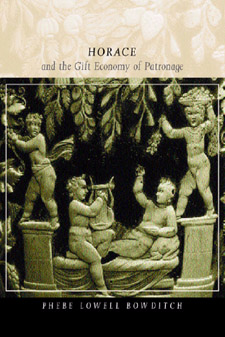 | Title: Horace and the gift economy of patronage Author: Bowditch, Phebe Lowell 1961- Published: University of California Press, 2001 Subjects: Classics | Classical Literature and Language | Poetry | Cultural Anthropology Publisher's Description: This innovative study explores selected odes and epistles by the late-first-century poet Horace in light of modern anthropological and literary theory. Phebe Lowell Bowditch looks in particular at how the relationship between Horace and his patron Maecenas is reflected in these poems' themes and rhetorical figures. Using anthropological studies on gift exchange, she uncovers an implicit economic dynamic in these poems and skillfully challenges standard views on literary patronage in this period. Horace and the Gift Economy of Patronage provides a striking new understanding of Horace's poems and the Roman system of patronage, and also demonstrates the relevance of New Historicist and Marxist critical paradigms for Roman studies. In addition to incorporating anthropological and sociological perspectives, Bowditch's theoretical approach makes use of concepts drawn from linguistics, deconstruction, and the work of Michel Foucault. She weaves together these ideas in an original approach to Horace's use of golden age imagery, his language concerning public gifts or munera, his metaphors of sacrifice, and the rhetoric of class and status found in these poems. Horace and the Gift Economy of Patronage represents an original approach to central issues and questions in the study of Latin literature, and sheds new light on our understanding of Roman society in general. [brief] Similar Items |
| 18. | 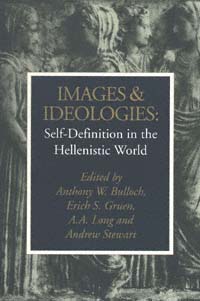 | Title: Images and ideologies: self-definition in the Hellenistic world Author: Bulloch, A. W Published: University of California Press, 1994 Subjects: Classics | Philosophy | Classical Philosophy | Ancient History | Art History Publisher's Description: This volume captures the individuality, the national and personal identity, the cultural exchange, and the self-consciousness that have long been sensed as peculiarly potent in the Hellenistic world. The fields of history, literature, art, philosophy, and religion are each presented using the format of two essays followed by a response.Conveying the direction and focus of Hellenistic learning, eighteen leading scholars discuss issues of liberty versus domination, appropriation versus accommodation, the increasing diversity of citizen roles and the dress and gesture appropriate to them, and the accompanying religious and philosophical ferment. The result is an arresting view of the incredible and unprecedented diversity of the Hellenistic world. [brief] Similar Items |
| 19. | 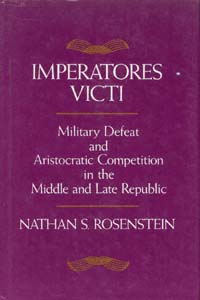 | Title: Imperatores victi: military defeat and aristocratic competition in the middle and late republic Author: Rosenstein, Nathan Stewart Published: University of California Press, 1990 Subjects: Classics | Classical History | Military History | Ancient History Publisher's Description: Given the intense competition among aristocrats seeking public office in the middle and late Roman Republic, one would expect that their persistent struggles for honor, glory, and power could have seriously undermined the state or damaged the cohesiveness of the ruling class. Rome in fact depended on aristocratic competition, since no professional bureaucracy directed public affairs and no salary was attached to any public office. But as Rosenstein adeptly shows, competition appears to have been surprisingly limited, in ways that curtailed the possible destructive effects of all-out contests between individuals. Imperatores Victi examines one particularly striking case of such checks on competition. Military success at all times represented an abundant source of prestige and political strength at Rome. Generals who led armies to victory enjoyed a better-than-average chance of securing higher office upon their return from the field. Yet this study demonstrates that defeated generals were not barred from public office and in fact went on to win the Republic's most highly coveted and hotly contested offices in numbers virtually identical with those of their undefeated peers.Rosenstein explores how this unexpected limit to competition functions, reviewing beliefs about the religious origins of defeat, assumptions about common soldiers' duties in battle, and definitions of honorable behavior of an aristocrat during a crisis. These perspectives were instrumental in shifting the onus of failure away from a general's person and in offering positive strategies a general might use to win glory and respect even in defeat and to silence potential critics among a failed general's peers. Such limits to competition had an impact on the larger problems of stability and coherence in the Republic and its political elite; these larger problems are discussed in the concluding chapter. [brief] Similar Items |
| 20. | 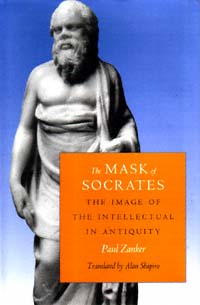 | Title: The mask of Socrates: the image of the intellectual in antiquity Author: Zanker, Paul Published: University of California Press, 1996 Subjects: Classics | Art History | Art and Architecture | Ancient History Publisher's Description: This richly illustrated work provides a new and deeper perspective on the interaction of visual representation and classical culture from the fifth century B.C. to the fourth century A.D. Drawing on a variety of source materials such as Graeco-Roman literature, historiography, and philosophy, in addition to artistic renderings, Paul Zanker forges the first comprehensive history of the visual representation of Greek and Roman intellectuals. He takes the reader from the earliest visual images of Socrates and Plato to the figures of Christ, the Apostles, and contemporaneous pagan and civic dignitaries.Through his interpretations of postures, gestures, facial expressions, and stylistic changes of particular set pieces, we come to know these great poets and philosophers through all of their various personas - the prophetic wise man, the virtuous democratic citizen, or the self-absorbed bon vivant. Zanker's analysis of how the iconography of influential thinkers and writers changed demonstrates the rise and fall of trends and the movement of schools of thought and belief, each successively embodying the most valued characteristics of the period and culture. [brief] Similar Items |